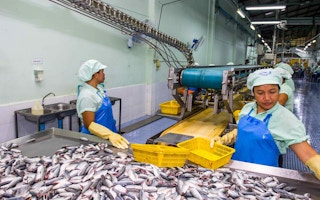With Thailand under international pressure to improve labor conditions in its lucrative seafood industry, a Thai tuna cannery has taken the unusual step of negotiating with hundreds of foreign workers over unpaid wages and benefits.
Talks with some its other workers were still under way but, as of Wednesday, the Golden Prize Canning Co. had agreed to pay out an estimated 80 million baht (US$2.25 million) as compensation to 1,450 workers, a labor activist told RFA. Many of these workers are migrants from Myanmar.
Separately, around 150 so-called piecemeal workers, full-time contractors who normally don’t receive medical insurance, vacation leave or other benefits, were demanding that the company compensate them like regular workers. They were planning to file a petition on Thursday with the local welfare and labor protection office in to order to spur Golden Prize to compensate them, the activist said.
“The employer agreed to pay 65 per cent of the outstanding wages and fringe benefits in the amount of roughly more than 80 million baht,” Suthasinee Kaewleklai, a staffer at the Migrant Worker Rights Network (MWRN), which provides legal assistance and translation service to migrants from Myanmar, told RFA.
She said the two sides agreed on Monday to set a two-year retroactive ceiling for unpaid back wages, in accordance with Thailand’s labor code.
“It is a payback of wages, overtime on public holidays and redemptions of deductions. When they took sick leave without showing medical certification, the employer deducted their wages,” Suthasinee said.
She said the Thai government in 2013 set a minimum daily wage of 300 baht per worker (U.S. $8.43), but employees on the factory floor at Golden Prize had only been paid 240 baht (U.S. $6.75) daily, and without public holidays or overtime.
‘Unprecedented’
The labor dispute at the factory in Samut Sakhon province, near Bangkok, which employs some 1,800 people, began in July. Last Thursday, managers at Golden Prize began to listen to their demands when workers staged a strike at the factory about 60 km (37 miles) from Bangkok.
Company representatives could not be reached for comment.
Andy Hall, a British labor rights activist involved in campaigns to eliminate exploitation of Southeast Asians in the workplace, hailed the results of the negotiations so far at the plant.
“Only because workers and MWRN applied pressure [through the] media and strike did we get the result. Official systems for dispute negotiations failed and only because military and senior officials applied pressure did we get such an unprecedented result,” Hall told RFA.
Last week’s work-stoppage led to an intervention by the provincial governor, Thai labor officials, and a Navy-run agency whose mission is to combat illegal fishing in Thailand.
“We sent in a team to help mediate negotiations because this issue has been lingering for a long time. We acted like a referee,” Vice Admiral Jumpol Lumpikanon, a spokesman for the Command Center for Combatting Illegal Fishing (CCCIF), told RFA by phone.
Golden Prize began to pay out factory workers on Monday and Tuesday, said the head of the province’s welfare and labor protection office.
“The factory ran out of cash so it took [a long time] to pay [them],” Boonlue Sartpetch told RFA by phone from Samut Sakhon.
‘No deadline’
Thailand’s multi-billion seafood industry is an important sector in its economy. The country is the world’s third largest exporter of seafood products, but last year’s exposure in the press of allegations of the slave-like exploitation of foreign workers has caused repercussions in two huge foreign markets.
The United States, for one, was moving late last month to ban imports of products made by children or slave labor. Last April, the European Union handed Thailand a “yellow card” warning that the EU might ban Thai seafood imports if the country did not improve industry standards and align them with European standards on illegal, unregulated and unreported fishing practices (IUU).
The yellow card’s six-month deadline was to have expired in October but, according to Vice Adm. Jumpol, the EU has yet to set a new date for Thailand to meet the IUU, or face a ban.
Instead, as of January 2016, the European Union asked Thailand to add the elimination of exploitative workplace conditions and fair labor practices to its IUU obligations, as well as have fisheries experts consult with Bangkok for the next two years on how to implement and enforce IUU-related measures, Jumpol said.
“There was no deadline, but measures to follow up over the span of two years,” he said.
Copyright © 1998-2016, RFA. Used with the permission of Radio Free Asia, 2025 M St. NW, Suite 300, Washington DC 20036.










